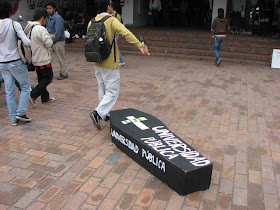 |
| A casket in the National University's student-named 'Lenin Plaza,' warning about the U's supposed fate. |
The proposed reforms include quality control systems, cuts in drop-out rates, the acceptance of private financing and the creation of for-profit public schools.
All of that sounds great. But in Colombia the public universities have a special status as bastions of leftist politics and protests again the establishment, ranging from university reforms like these to the existence of capitalism and the state itself. (Take a look at the graffiti on the National University campus in Bogotá, and you'll see for yourself.) Still, the public universities provide good educations.
 |
| A new Ché Guevara mural in La Nacho. |
Government officials also believe that universities play an important role in occupying young people who might otherwise join one of the illegal guerrilla or paramilitary organizations. (Of course, a look at the pro-guerrilla graffiti in the National University in Bogotá suggests that higher education can convert some students into guerrillas.)
In the United States, where many public universities accept money for research projects, sports financing and other purposes, the policy has been controversial. Private universities can influence the type of research that is done, and whether or not the results are published.
 |
| Privatize this! A communal meal being prepared in La Nacho's Ché Plaza. |
By Mike Ceaser, of Bogotá Bike Tours
No comments:
Post a Comment